
All iLive content is medically reviewed or fact checked to ensure as much factual accuracy as possible.
We have strict sourcing guidelines and only link to reputable media sites, academic research institutions and, whenever possible, medically peer reviewed studies. Note that the numbers in parentheses ([1], [2], etc.) are clickable links to these studies.
If you feel that any of our content is inaccurate, out-of-date, or otherwise questionable, please select it and press Ctrl + Enter.
Pills for thrush
Medical expert of the article
Last reviewed: 03.07.2025
Thrush pills are medications that effectively fight Candida fungi that affect the mucous membranes of organs. Let's look at the most popular and effective pills for thrush, their principle of action, indications, contraindications and possible side effects.
Thrush is an insidious disease that affects both adults and children. As a rule, the disease affects the mucous membranes of the genitals and the oral cavity. Candida fungi are always present on the mucous membranes, but the body's immune system does not allow them to penetrate inside. As soon as the protective functions of the immune system are reduced, the fungi penetrate the mucous membranes and cause a disease called candidiasis or thrush. The immune system can reduce its protective functions due to diseases, both chronic and seasonal (colds, allergies) or the presence of pathologies in the body.
The main symptom of thrush is reddening of the mucous membranes, swelling, and the appearance of a white or yellowish coating of a curdled consistency. If the coating is removed without treatment, erosion will remain on the affected surface of the mucous membrane. It causes severe itching and pain, so the disease requires mandatory treatment.
Today, there are many drugs that help cure the disease. But self-medication is not recommended, since only after taking tests, a doctor's consultation and examination can you get effective treatment. In addition, self-medication does not give the desired results and can worsen the course of the disease. All drugs used for treatment are divided into two groups:
- External use - ointments, solutions, creams, suppositories, vaginal tablets. Such drugs are made on the basis of such substances as clotrimazole, miconazole, levorin, nystatin. The drugs effectively cope with fresh fungal infections. The course of treatment is individual, but, as a rule, does not take more than 14 days. The main advantages of such treatment are a quick therapeutic effect, a minimum of side effects and safety of treatment. The disadvantage is that it can only be effective in treating mild forms of the disease, inconvenience in using the drugs.
- For oral administration, i.e. tablets for thrush. This treatment is used for recurrent forms or diseases with a severe course. Tablets for thrush block the synthesis of sterol in the cells of the infection, which prevents the fungus from multiplying. Some drugs destroy fungi. The disadvantage of this treatment is possible side effects, addiction to the drug and the transition of the disease to a chronic form.
Indications for the use of tablets for thrush
Indications for the use of tablets for thrush are based on the action of medicinal drugs, that is, the restoration of microflora and the treatment of Candida fungi. When the disease appears, it is very important to seek medical help. Since without proper and effective treatment, the disease will constantly recur and cause more painful and unpleasant symptoms. Of course, one tablet is unlikely to solve the problem with pathology, so a comprehensive approach to treatment is necessary. Let's consider in which cases the use of tablets for thrush is justified.
- Ineffective treatment with douching, applications and other local remedies.
- The disease is chronic and recurs with the slightest damage to the immune system.
- Generalized form of candidiasis – occurs against the background of a weakened immune system and diseases of the body. Characterized by a chronic form of the disease, it affects not only the mucous membranes.
- Features of the genitals (anatomical structure in women) that do not allow the use of local therapy for treatment.
Tablets for thrush, that is, antifungal drugs are divided into local and systemic. Local use means tablets that are inserted into the vagina, and systemic means tablets for oral administration.
Once the tablet has entered the body, its active ingredients are absorbed and distributed throughout the body. This stops the growth and reproduction of Candida fungi. The advantage of tablets for thrush is that they help cure any form of candidiasis. In addition, tablet treatment is considered the most effective, since the result occurs in a short period of time. As for the disadvantages of tablets, these are contraindications to their use, side effects and toxicity.
Pharmacodynamics of tablets for thrush
Pharmacodynamics of tablets for thrush is the localization and mechanism of action of drugs. Let's consider pharmacodynamics using the example of one of the most effective - Fluconazole. So, the drug belongs to the class of triazole antifungal drugs, with a powerful selective fungal enzyme. The action of the drug is that Fluconazole prevents the transformation of lanosterol into ergosterol, which acts as the main component of the membranes of cellular Candida fungi.
The drug is active against Candida spp. (albicans, tropicalis), Cryptococcus neoformans, Microsporum spp., Trichophyton spp. Fluconazole is rapidly absorbed and its bioavailability is 90%. The maximum concentration is 150 mg in blood plasma, observed when taking the drug on an empty stomach. However, absorption does not depend on food intake. It penetrates into biological fluids of the body, including the cerebrospinal fluid. The concentration of Fluconazole in sputum and saliva is similar to the content in blood plasma.
Pharmacokinetics of tablets for thrush
Pharmacokinetics of tablets for thrush is the body's reaction to the drug taken. The active substance contained in the medicine is absorbed by the stomach and enters the blood. The circulatory system carries the drug throughout the body, providing a therapeutic effect to the affected internal organs.
The active antifungal substance remains in the body for a long period of time and is excreted by the kidneys. The composition of tablets for thrush may include such active substances as: nystanin, natamycin, fluconazole, ketoconazole and others. They differ in dosage and speed of absorption in the body. But at the same time, all the above-mentioned substances destroy Candida fungi and prevent their reproduction.
As a rule, the doctor prescribes Fucis, Fluconazole, Diflucan and others to patients with the disease. But if the patient has contraindications to taking pills (allergy, renal and hepatic insufficiency, pregnancy and breastfeeding), the doctor individually selects antifungal drugs. Please note that the effect of any pills for thrush will be less effective if the patient takes drugs that reduce blood clotting.
Instructions for use of tablets for thrush
Instructions for thrush tablets are a guide for the patient, which describes the rules for using the drug, the recommended dosage, possible side effects and contraindications. Let's look at the main points from the instructions.
- Pharmacological group
All tablets for thrush are antifungal drugs. Antifungal drugs are classified by the active ingredients they contain. There are antifungal drugs in combinations.
- Indications for use
This section of the instructions describes the main diseases that are to be treated with the drug. The main indications for use are: systemic infections caused by fungi sensitive to the drug, candidal skin lesions, dermatoses, mycoses, prevention of fungal diseases in the presence of an increased risk.
- Release form
Since we are talking about tablets for thrush, the antifungal drug is released in tablet form. Tablets are divided into drugs for local (vaginal tablets) and systemic use (for oral administration). The doctor selects the most convenient form of the drug so that the patient does not experience any inconvenience during the treatment.
- Pharmacodynamics and pharmacokinetics
This category describes the principles of action of antifungal drugs after they enter the body. That is, the rate of absorption, distribution, absorption, bioavailability, binding to blood proteins, metabolism, half-life and elimination. Tablets for thrush are quickly absorbed by the stomach, effectively carried by the circulatory system, due to which the therapeutic effect occurs in a short period of time.
- Use during pregnancy
It is not advisable to use tablets for thrush during pregnancy, as many drugs have a negative effect on the course of pregnancy and the development of the child. The doctor's task is to prescribe drugs that will not pose a threat to the mother and child. The safest tablets for pregnant women are Nystatin, Zalain, Pimafucin, Sertaconazole, Terzhinan. But Fluconazole, Miconazole, Itraconazole are contraindicated for pregnant women, as they pose a potential risk to the child.
- Contraindications for use
Tablets for thrush are not prescribed for hypersensitivity to the active substances that destroy the Candida fungus. Tablets are not recommended during pregnancy and lactation, with liver and kidney problems, and for children under two years of age.
- Side effects and overdose
If the dosage is not followed or the drug is taken by patients who have contraindications, tablets for thrush can cause nausea, vomiting, gastrointestinal disorders. Sometimes antifungal drugs lead to hormonal imbalance in the body, the development of hepatitis and severe toxic reactions. Most often, patients complain of headaches, drowsiness, dizziness, allergic reactions on the skin, convulsions.
- Method of administration and dosage
The dosage is prescribed by the attending physician and depends on the test results. Some tablets are designed for a week-long course of treatment, while others have an antifungal effect after two to four tablets.
The instructions also describe the storage conditions and shelf life, the interaction of antifungal tablets with other drugs. When buying any tablets and any medicines, you must read the instructions. Since it contains warnings and answers to current questions regarding the treatment process and the effectiveness of the tablets.
1 tablet for thrush
1 tablet for thrush is used as a preventive measure against fungal infection. One tablet allows you to completely cure candidiasis. Such a preventive measure allows you to get rid of the disease if it is chronic and appears once every six months to a year.
One Flucostat tablet helps to get rid of the early symptoms of the disease, both in women and men. But in addition to antifungal drugs, it is necessary to take immunorestorative drugs and vitamins. Thrush appears because the body loses the ability to control the number of fungal infections and their activity. Sometimes even a mild cold can cause the disease. But very often the symptoms that accompany candidiasis indicate other diseases of the body that have similar symptoms. Therefore, before taking any pills, you need to take tests and undergo a doctor's examination.
2 tablets for thrush
2 tablets from thrush of an effective drug, like Difluzol, help to get rid of the first symptoms of an unpleasant disease caused by Candida fungi. Two tablets from thrush are also used as a disease prevention scheme. Difluzol belongs to the class of triazole antifungal drugs. The tablets are recommended to be used in a dosage of 150 mg. They help to cure both vaginal candidiasis, which has a chronic form, and candidiasis, which has been recently diagnosed.
Two tablets of 150 mg eliminate the disease for a long period of time. If Difluzol is used in complex treatment, that is, with diet, restoration of immunity and medical procedures (washing, douching, baths), then you can get rid of thrush forever.
3 tablets for thrush
3 tablets for thrush is a popular effective treatment regimen for candidiasis. The drug Tinidazole helps cure the disease with three tablets. It is active against most anaerobic microorganisms and fungi. Tinidazole tablets are used to treat candidiasis, giardiasis, trichomoniasis and other infections.
It is recommended to take tablets for thrush after meals in a dosage of 2 g, once a day for three days. The main contraindications for use: hypersensitivity, pregnancy and lactation, diseases of the circulatory system, neurological pathologies, the patient's age under five years. If taken for more than three days, overdose symptoms will appear: vomiting, nausea, skin rash, headache, neurological complications. If the above symptoms appear, you must stop taking the drug and seek medical help.
 [ 11 ], [ 12 ], [ 13 ], [ 14 ], [ 15 ]
[ 11 ], [ 12 ], [ 13 ], [ 14 ], [ 15 ]
4 tablets for thrush
4 tablets from thrush are used for the prevention of candidiasis and treatment of chronic forms of candidiasis. There are several drugs that offer a course of treatment in four tablets. First of all, these are Fluconazole, Diflucan, Medoflucon.
The maximum dosage is 150 mg, but for a four-day course of treatment, it is recommended to take 100 mg. Preventive measures should be taken once every six months, but if the disease appears every month, then you can take one tablet at the first symptoms of the disease.
Nizoral and Oronazole can be used for treatment, but the duration of taking these drugs is five days, that is, you need to take five tablets. Please note that each drug has a number of contraindications and side effects. Therefore, before taking pills for thrush, you must read the instructions and consult a doctor.
Any tablets for thrush should be taken with special caution by elderly patients and people with liver and kidney diseases. During preventive therapy, both partners should take medications (in case of vaginal candidiasis). Do not forget about external medications, for example, Mifungar cream and regular intake of vitamin complexes to support the immune system.
 [ 16 ], [ 17 ], [ 18 ], [ 19 ]
[ 16 ], [ 17 ], [ 18 ], [ 19 ]
Pills for thrush for men
Pills for thrush for men help to cope with unpleasant symptoms caused by a fungal disease - candidiasis. Despite the fact that in men the disease proceeds much faster than in women and with less pronounced symptoms, the task of doctors is to diagnose the disease in a timely manner. Only timely recognition of symptoms will help to cure candidiasis and prevent the transformation of the disease into a chronic form.
During treatment, complex immunomodulatory therapy is carried out. Patients are prescribed not only tablets for thrush, but also vitamin complexes and other drugs to strengthen the body's defenses. Tablets are prescribed for a protracted course of the disease or in case of complications. Let's look at effective drugs for men.
- Fluconazole is an antifungal drug that inhibits the synthesis of Candida fungi and gradually destroys them. The peculiarity of this drug is that it is well absorbed and maintains its concentration in the blood plasma for a long time. This allows you to prolong the therapeutic effect of the drug.
- Flucostat is an anticomicotic drug that effectively neutralizes Candida fungal infections. Flucostat is concentrated in tissues and biological fluids of the body.
- Itraconazole is a broad-spectrum drug that has proven itself to be highly effective. Itraconazole destroys the fungal membrane at the cellular level, which leads to their destruction. It quickly spreads throughout the body and maintains a therapeutic effect for a long period of time.
Tablets for thrush in women
Tablets for thrush in women are effective antifungal drugs that help get rid of Candida fungi. All drugs have several varieties, which completely depend on the chemical structure of the active substances.
A group of antifungal drugs |
Name of the drug (tablets) |
Active ingredient |
Imidazoles |
Canesten |
Clotrimazole |
Ginezol |
Miconazole |
|
Ovulum |
Isoconazole |
|
Oronazole |
Ketoconazole |
|
Nizoral |
||
Polyenes |
Polygynax |
Nystatin |
Pimafucin |
Natamycin |
|
Levorin |
Levorin |
|
Nystatin |
||
Terzhinan |
||
Triazoles |
Diflucan |
Fluconazole |
Orungal |
Itraconazole |
|
Flucostat |
||
Mikosist |
Very often, Nystatin is used to treat fungal diseases in women. But due to its frequent use, it is not very effective in combating thrush. An alternative to Nystatin is Natamycin and Levorin. It is taken orally every 6-10 hours, the dosage of tablets is determined by the attending physician. The most popular and used is Fluconazole. The action of the antifungal agent is based on fewer side effects and high efficiency. The choice of an antifungal drug for the treatment of the disease should be based on the results of tests.
Tablets for thrush for children
Thrush tablets for children are antifungal drugs that help to safely cure candidiasis with minimal side effects. Let's look at several effective drugs that will help cure thrush in children.
- Miramistin is an antibacterial antifungal drug with a broad spectrum of action. It has two forms of release: ointment and solution. The affected areas are wiped with gauze soaked in the solution or the ointment is applied (in a thin layer). The dosage depends on the symptoms of the disease and the age of the child.
- Nystatin - has three forms of release: ointment, tablets, vaginal suppositories. The peculiarity of the drug is that the active substance effectively destroys Candida fungi. Nystatin is used to treat severe forms in newborns and premature babies. During the administration of the drug by the child, it is very important to monitor his well-being, since Nystatin can cause an allergic reaction.
- Candid is an antifungal drug similar in action to Nystatin. Candid is available in the form of ointment, tablets, drops and suppositories. For small children, it is prescribed in the form of drops. The affected areas of the skin and oral cavity are wiped with a gauze swab with the drug. The procedure is carried out 2-3 times a day, the course of treatment takes about 10 days.
In addition to medications, folk medicine is used to treat thrush in children. But the use of any medications, including folk medicine, must be approved by a doctor.
Names of tablets for thrush
Knowing the names of the tablets for thrush and their effectiveness, you can choose a good remedy for the treatment of candidiasis. There are several types of drugs for the treatment of fungal diseases. These are specific chemical compounds and combinations of various substances that are active against Candida fungi. The standard classification is based on the chemical structure of the tablets. In addition, toxicity, the principle of action and the body's tolerance during treatment are important.
Thrush or candidiasis is the number 1 disease that people go to gynecology for. Today, the antifungal drug market offers many tablets that can cure the disease in a short period of time. Let's look at the most popular antifungal agents and the names of tablets for thrush.
- Diflucan is a popular and effective drug used in treatment. The active ingredient is fluconazole, which stops the growth of Candida fungi. Diflucan is so effective that even one 150 mg tablet can prevent the disease. It is prohibited to take during pregnancy and lactation, as well as for people with kidney and liver diseases.
- Clotrimazole is one of the cheap but effective drugs for thrush. The drug is contraindicated in the first trimester of pregnancy and during lactation. It has different dosages, so each patient can choose the duration of treatment.
- Livarol - is produced in the form of vaginal tablets and suppositories. The active substance - ketoconazole allows you to get rid of thrush in five days, and chronic candidiasis in ten.
- Mikosist and Mikomax – both drugs contain the active ingredient fluconazole. The drugs are contraindicated for pregnant women and children under six years of age, but they allow you to get rid of candidiasis of any form.
- Terzhinan is an antibacterial drug that has an antifungal effect. The peculiarity of this drug is that it can be taken even during menstruation. It is sold in the form of vaginal tablets, and is approved for use during lactation and pregnancy (except for the first months).
All the above-described tablets for thrush have different principles of action, effectiveness and contraindications. Despite the fact that they are all intended to treat the disease, before using any remedy, you must consult a doctor and read the instructions.
Fluconazole for thrush
Fluconazole is an effective drug that has antifungal properties. It is produced in the form of tablets and solution. Tablets are from 50 mg to 150 mg of the active substance, and the solution is released in 50 ml bottles, each ml contains 2 mg of fluconazole. It has a broad spectrum of action, is active against Candida fungi (albicans, tropicalis and parapsilosis). Fluconazole is less toxic compared to other antifungal drugs.
- The drug is well absorbed and slowly excreted from the body. Bioavailability is at the level of 80%. Concentration in blood serum is 75%. Fluconazole is excreted by the kidneys, about 80% is excreted unchanged.
- Main indications for use: candidiasis, onychomycosis, coccidioid meningitis, cryptococcosis. The antifungal agent is well tolerated, side effects are extremely rare. But if you do not follow the dosage and rules for taking fluconazole, side effects such as nausea, headache, diarrhea, vomiting, and possible allergic reactions may occur.
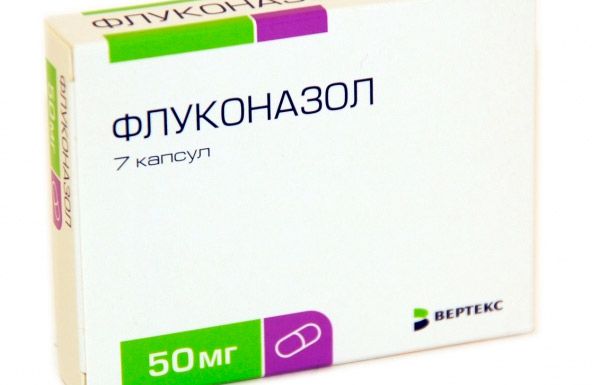
- It is not recommended to take during pregnancy and lactation. Since the active substances of fluconazole penetrate the placental barrier and are excreted in breast milk, which negatively affects the development of the child. If the drug is prescribed to newborns, there should be a long break between doses.
- When treating elderly patients, a doctor's dose adjustment is required. Special dose adjustment is also necessary for patients with kidney and liver diseases. Fluconazole is not prescribed to patients taking Cisapride. The average daily dose is 0.1-0.6 g, the duration of treatment depends on the symptoms of the disease.
When taking Fluconazole for preventive purposes, a small dose of the drug is used. Fluconazole can only be taken for medical reasons, since self-medication can lead to worsening of symptoms.
Flucostat for thrush
Flucostat is an antifungal drug with the active ingredient fluconazole. It is available in the form of 50-150 mg tablets, syrup and solution for intravenous administration. The antifungal agent is effective against mycoses caused by Candida spp., Cryptococcus, Microsporum spp., Trichophyton spp., Coccidioides immitis, Histoplasma capsulatum.
- After ingestion, the substance penetrates into the body's fluids and tissues, and its bioavailability is 90%. Flucostat is concentrated in blood plasma, and the concentration in saliva, sweat fluid and sputum is equal to the concentration in the blood. It is excreted by the kidneys, about 80% is excreted unchanged in the urine.
- The method of administration and dosage depend on the disease to be treated. For vaginal candidiasis and chronic thrush, it is recommended to take 150 mg for 1-3 days. If thrush is recurrent, then one tablet of Flucostat 150 mg once every six months is enough. When treating the generalized form, the dosage can be from 400 mg on the first day and 200 mg for the rest of the treatment period.
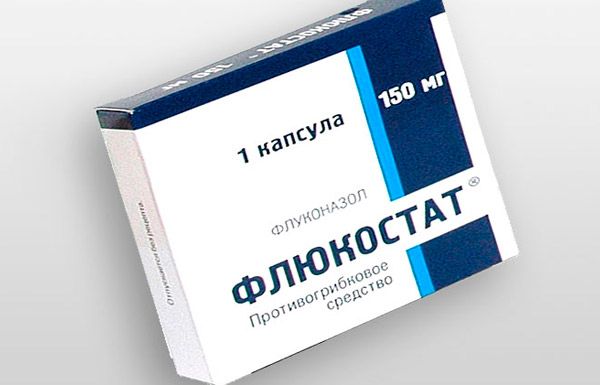
- It should be used with special caution in patients with kidney and liver damage. During pregnancy and lactation, treatment with the drug is possible only with a doctor's permission. To treat an overdose, it is necessary to wash the stomach and symptomatic therapy.
- As for special instructions for use, Flucostat can cause hepatotoxic action, which leads to death. But this is possible only if the drug is taken not as prescribed with a dosage significantly exceeding the norm.
- The use of flucostat may cause side effects: vomiting, cramps, flatulence, nausea, abdominal pain, allergic skin reactions. To treat an overdose, it is necessary to stop taking it and conduct symptomatic therapy.
The drug should be taken with special caution with other drugs, as drug interactions can cause adverse reactions and overdose symptoms. Flucostat should be stored at a temperature of 5° to 30°C, and the shelf life is two years from the production date indicated on the package.
Clotrimazole for thrush
Clotrimazole is a synthetic drug that belongs to the group of second-generation antimycotics, i.e. to imidazole derivatives. It is produced in the form of vaginal tablets of 100, 200 and 500 mg of the active substance, in the form of suppositories, ointment, cream and solution for intravenous administration. Clotrimazole has a broad spectrum of action and effectively fights fungal infections, slowing their growth. It is active against most pathogens of fungal infections.
- The drug is poorly absorbed through the digestive system, which is why the most popular form of release is vaginal tablets and suppositories. Clotrimazole is concentrated in tissues and effectively fights infection.
- The main indications for use are candidiasis, vulvovaginal thrush, trichomoniasis, skin lesions of thrush, candidomycosis lesions of the feet and palms, nails, fingers, lichen, erythrasma. It is also used for the prevention of fungal diseases.
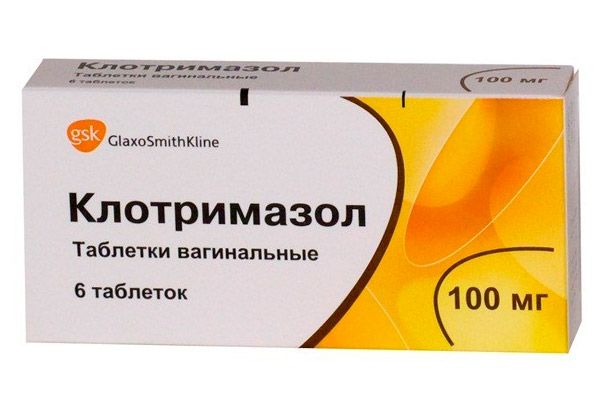
- Clotrimazole is contraindicated during pregnancy (in the first trimester) and during lactation. If the rules of administration are not followed, side effects such as allergic reactions, itching, rash, peeling skin, urticaria occur. When treating vaginal thrush, the drug should be stopped during menstruation.
- The method of application and dosage depend on the disease to be treated and its symptoms, the presence of contraindications to use, the patient's age and the presence of chronic diseases. The average course of treatment takes from 5 to 10 days. When using the ointment for external use, the duration of treatment can be up to 20 days or more.
Pimafucin for thrush
Pimafucin is used as an antimicrobial antibiotic. The active substance is natamycin, a polyene antibiotic. It is produced in the form of tablets of 100 mg of the active substance, in the form of a cream and vaginal suppositories.
- Main indications for use: prevention and treatment of candidiasis, treatment of vaginal thrush, non-invasive candidiasis of the intestines and mucous membranes.
- Contraindicated for use in case of hypersensitivity to the active substance and systemic candidiasis. The antifungal agent is used with special caution in case of kidney and liver disease.
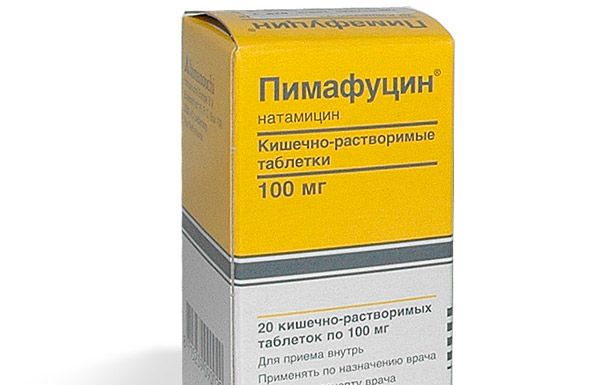
- The method of application and dosage of Pimafucin depend on the disease to be treated and the form of release. If the drug is used to treat intestinal lesions caused by Candida fungi, patients take one tablet four times a day. When treating vaginal thrush, take one tablet for three to seven days.
Pimafucin is valued for its effectiveness in treatment, minimal side effects and contraindications. But, like all medications, this drug is recommended to be taken only after consulting a doctor.
 [ 29 ], [ 30 ], [ 31 ], [ 32 ]
[ 29 ], [ 30 ], [ 31 ], [ 32 ]
Nystatin for thrush
Nystatin is an effective drug used to treat superficial forms of candidiasis. It belongs to polyene antibiotics and antimycotics of natural origin. Nystatin is available in the form of tablets, vaginal and rectal suppositories and ointments. This allows you to choose the most convenient form of the drug for effective treatment.
- Nystatin is absorbed in the gastrointestinal tract and has low toxicity. It is active against Candida spp. Nystatin destroys fungal microorganisms and is not addictive, so it is effective in treating any form of the disease.
- The method of administration and dosage are prescribed individually for each patient. The tablets must not be chewed and must be washed down with plenty of water when taken. The interval between doses of the drug should be at least six hours. The course of treatment lasts from 10 to 14 days, but the duration of treatment is selected individually for each patient.
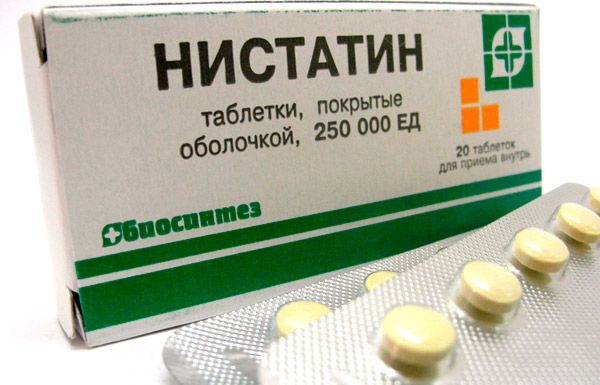
- The main indications for the use of the drug are candidal lesions of various localizations, vaginal candidiasis, thrush in the mouth, digestive tract, lesions of the respiratory organs and skin. It is also used for the prevention of the disease in case of its relapses.
- Due to non-compliance with the dosage or the presence of contraindications to its use, Nystatin causes nausea, vomiting, allergic reactions on the skin, increased stool frequency, burning. Nystatin is contraindicated in case of hypersensitivity to the active substance. The drug should be discontinued when treating patients under five years of age. Also, it is contraindicated to take Nystatin with Clotrimazole, since the latter reduces the effectiveness of the drug.
Fucis for thrush
Fucis is prescribed to many patients. It belongs to the group of broad-spectrum antifungal agents. Its active ingredient fluconazole is active against Candida spp. and in generalized forms of the disease.
- After application, Fucis is absorbed in the gastrointestinal tract, its bioavailability is 90% or more. It can be taken both during meals and before or after meals, this does not affect the absorption of the drug. The maximum concentration of Fucis in the blood plasma is observed 30-60 minutes after administration.
- It is used to treat: thrush of various localizations and forms, fungal and infectious lesions of the respiratory system, genitourinary system, and also for the prevention of candidiasis.
- The dosage and duration of treatment depend on the individual characteristics of the patient's body and the symptoms of the disease. Since the drug is available in 50, 100, 150 and 200 mg of fluconazole, treatment can be from 1 to 10 days, and the intake is from three to one tablet per day.
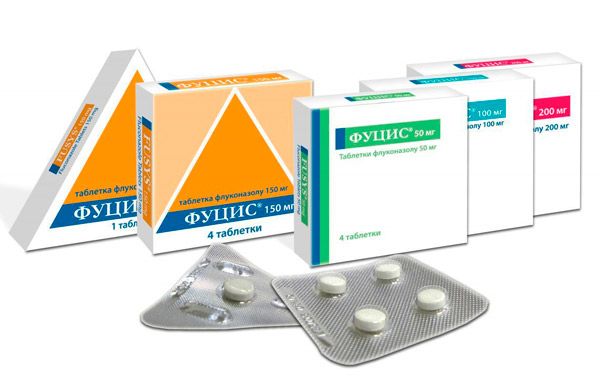
- Fucis can cause a number of side effects, such as headache, convulsions, arrhythmia, nausea, vomiting, allergic skin reactions, itching, alopecia. It can cause an increase in cholesterol and triglycerides in the blood. The drug is contraindicated during pregnancy and lactation, for patients under seven years of age, and for patients whose work involves driving machinery or vehicles.
- Due to non-compliance with the rules for taking Fucis, patients experience side effects such as: headache, hallucinations, dizziness. When treating overdose symptoms, patients undergo gastric lavage and symptomatic treatment.
Difluzol for thrush
Difluzol has antifungal and highly specific action. Active ingredient – fluconazole. Main indications for use of Difluzol: cryptococcosis, thrush of any type and any localization, endemic mycoses, prevention of fungal diseases.
- Available in 150 mg tablets. Long half-life (30 hours), suggests that Difluzol should be taken once a day.
- When treating vaginal candidiasis, take 150 mg for three days. If thrush has affected the mucous membranes, take 50 mg for 2-3 weeks. When treating fungal infections in newborns, Difluzol is taken once every three days for four weeks.
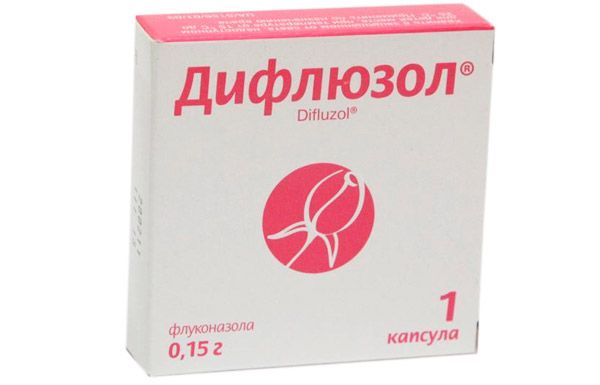
- Contraindicated during pregnancy and lactation, as the active ingredients penetrate the placental barrier and negatively affect the development of the child. Patients with cardiovascular diseases, kidney and liver pathologies should take tablets for thrush with special caution.
- Difluzol for thrush should be stored at room temperature. The shelf life of the medicine is four years from the production date indicated on the package.
 [ 35 ]
[ 35 ]
Mikosist for thrush
Mikosist is another antifungal drug with the active ingredient fluconazole. It is produced in the form of syrup, solution for infusions and tablets of 50, 100 and 150 mg. The pharmacodynamics and pharmacokinetics of Mikosist are completely consistent with Fluconazole.
- The main indications for the use of Mikosist are fungal infections of various localizations, but most often used for treatment. Tablets for thrush help cure chronic and acute recurrent vaginal candidiasis, visceral candidiasis, eye candidiasis, lesions of the abdominal organs, respiratory system and mucous membranes.
- The dosage of the drug and the duration of treatment depend on the results of the tests and the symptoms of the disease. For the treatment of recurrent thrush, a course of three tablets of 150 mg is prescribed. A similar treatment regimen is used when early symptoms of the disease appear (itching, redness, inflammation of the mucous membrane). The treatment period can be from 3 days to 6 months (in the treatment of cryptococcal meningitis, mycosis of the feet and smooth skin).
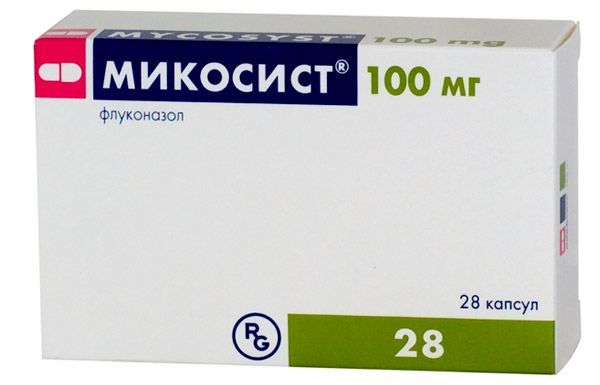
- In some patients, the use of the drug causes a number of side effects. This may be due to individual intolerance to the antifungal agent or failure to comply with the dosage and rules for taking the drug. The main side effects are nausea, convulsions, headache, vomiting, increased bilirubin levels. Rarely, kidney and liver dysfunction, pathologies in the functioning of the hematopoietic organs and allergic reactions occur.
- The main contraindications for the use of Mikosist are: hypersensitivity to the active substance, kidney and liver disease, pregnancy and lactation. It is not recommended to take Cisapride, Astemizole and Terfenadine at the same time.
- Mikosist is allowed to be taken with oral contraceptives, since such interaction does not cause side effects. With special caution, Mikosist should be taken with hypoglycemic drugs, since hypoglycemia may develop. When taken with Rifampicin, the antifungal agent is quickly eliminated from the blood, so an increase in the dosage of Mikosist is required.
- It is recommended to store tablets for thrush in a dry place protected from sunlight, observing the temperature regime from 5° to 30°C. The shelf life of Mikosist is two years.
Nizoral for thrush
Nizoral is a popular antifungal agent with a broad spectrum of action. The active substance is ketoconazole. It is active against: Pityrosporum orbiculare, Cryptococcus spp., Epidermophyton floccosum, Microsporum spp., Candida spp.
- The main indications for the use of the antifungal agent: treatment and prevention of mycoses, fungal lesions of the mucous membranes of the body, treatment and prevention of candidiasis, treatment of mycoses of the skin, soft tissues and nails. It is used to prevent fungal infections in patients with a weakened immune system.

- It is necessary to take tablets for thrush during meals. The maximum daily dose of Nizoral for adults is 200 mg, but for special indications, the dosage can be increased to 400 mg. The dose of the drug for children weighing from 15 to 30 kg is 100 mg of Nizoral per day. The duration of treatment depends on the disease. For symptoms of incipient thrush, it is recommended to take three tablets of 150 mg. For chronic and generalized candidiasis, 400 mg is prescribed for five days.
- Side effects include headache, nausea and vomiting, dizziness, paresthesia, menstrual irregularities, thrombocytopenia. In some cases, Nizoral causes itching, burning sensation and skin rashes.
Nizoral is contraindicated in case of hypersensitivity to the active substance. The antifungal agent is not recommended for use in the treatment of thrush in patients with kidney and liver diseases. Contraindicated for pregnant women and patients over 50 years of age.
Livarol for thrush
Livarol is an effective antifungal drug with the active ingredient ketoconazole. It is produced in the form of vaginal suppositories, as this provides the most effective therapeutic effect. Livarol is active against staphylococcal, streptococcal and a number of other fungal infections.
- Livarol is used to treat and prevent vaginal candidiasis. It is used to prevent recurrent thrush and to treat decreased resistance due to long-term use of antibiotics.
- The method of administration and dosage of the drug depend on the symptoms of the disease and the individual characteristics of the patient's body. Livarol is recommended to be used before bedtime. For the treatment and prevention of the disease, it is enough to administer one suppository for 3-6 days. For the treatment of recurrent chronic candidiasis, it is necessary to use one suppository for 10 days.
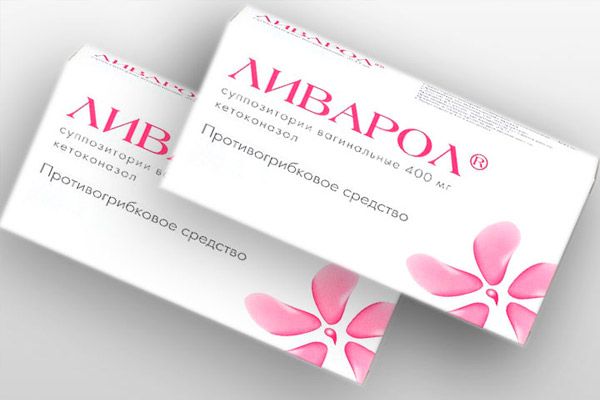
- Livarol is used with special caution during pregnancy and lactation. It is prohibited to use in early pregnancy, and when treating the disease in the second trimester of pregnancy, treatment should be carried out under the supervision of a doctor.
- Due to non-compliance with the dosage of the drug and the rules of its use, side effects are possible. Livarol causes irritation of the vaginal mucosa, itching, skin rash and urticaria.
- The main contraindications for the use of Livarol: first trimester of pregnancy, hypersensitivity to the active substance. Please note that when treating chronic thrush, both sexual partners must take the medication.
- Livarol should be stored in a dry, dark place at a temperature of up to 25°C. The shelf life is two years. Livarol is not recommended for use without a doctor's permission.
Irunin for thrush
Irunin is a broad-spectrum drug with the active substance itraconazole. It is produced in the form of vaginal tablets of 200 mg and tablets for oral administration of 100 mg. Irunin is a synthetic antifungal drug. The action of the drug is based on the suppression of the synthesis of cell membranes of fungi. The drug is active against yeast-like fungi, Candida fungi, mold fungi, dermatophytes.
- The main indications for the use of Irunin: fungal keratitis, candidiasis of various localizations, fungal keratitis, systemic aspergillosis, sporotrichosis, mycoses, pityriasis versicolor, deep visceral candidiasis. For vaginal candidiasis, it is necessary to use 2 tablets of 200 mg for thrush twice a day for two to three days. For prevention, it is enough to take one tablet of Irunin.
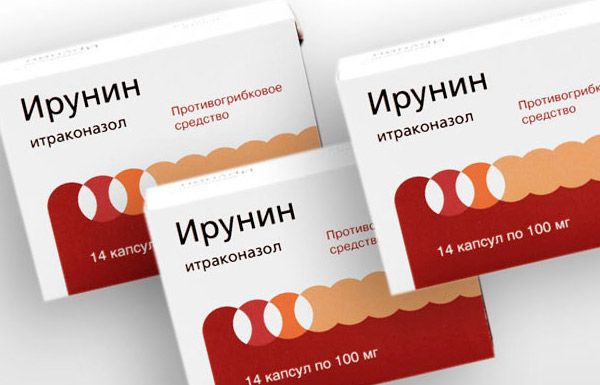
- During pregnancy, the drug is prescribed to treat systemic mycoses. But the use of the drug is possible only after the doctor's permission and in the case when the therapeutic benefit for the mother is more important than the potential risks for the baby. Irunin causes side effects. Most often, patients experience: nausea, constipation, headache, itching, rash, dizziness, allergic reactions.
- Like all antifungal drugs, Irunin has a number of contraindications for use. It is prohibited to use for patients with hypersensitivity to the drug, during menstruation. Tablets for thrush should not be taken without a doctor's permission by patients with kidney and liver diseases. Irunin is prescribed with special caution to children and elderly patients.
- Irunin is prohibited to be taken simultaneously with such drugs as: Astemizole, Cisapride, Pimozode, Midazolam. When used simultaneously with calcium channel blockers, special care must be taken and the condition of the body must be monitored. When interacting with antacids, Irunin is recommended to be taken with a break of two to three hours.
Mycomax for thrush
Mikomax is a drug with the active substance fluconazole. The peculiarity of the drug is that it is much more effective than other antifungal agents. The drug is active against yeast-like fungi Candida, as well as Cryptococcus, Microsporum, Trichophyton. The drug is used to treat endemic mycoses caused by Blastomyces dermatitidis, Coccidiodes immutis, Hystoplasma capsulatum.
- The drug is well absorbed, and its bioavailability is 90%. The maximum concentration of Mikomaks in the blood plasma is achieved 1-1.5 hours after taking the drug on an empty stomach. The drug is effectively and evenly distributed throughout the body and binds to blood proteins by 10-12%. The drug is excreted unchanged in the urine. Mikomaks is available in the form of tablets for thrush with a dosage of 100 and 150 mg of the active substance and in the form of a solution.
- The main indications for the use of the antifungal agent: prevention and treatment of fungal diseases. Prevention and treatment of systemic candidiasis, candidal lesions of the mucous membranes, genital candidiasis (chronic, acute, generalized). Mikomaks effectively combats dermatomycotic lesions of the skin of the feet, nails and groin areas, cryptococcal infections and endemic mycoses.
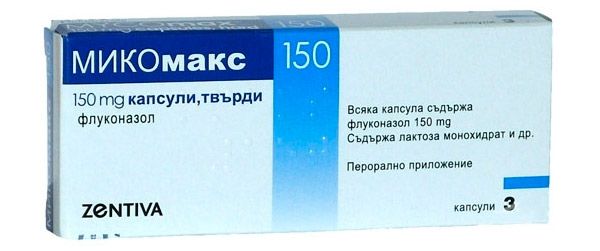
- The method of administration, dosage and duration of treatment depend on the severity of the fungal infection and the symptoms of the disease. The drug causes side effects: anaphylactic reactions, diarrhea, flatulence, headaches, skin rashes. Treatment of side effects is symptomatic.
- The main contraindications to the use of the drug are based on the action of the active substance fluconazole. Mikomaks is not recommended for patients under 16 years of age, people with kidney and liver diseases. Also, the antifungal agent is contraindicated for pregnant women and during lactation. Overdose symptoms cause headaches, gastrointestinal pathologies, allergic reactions to the skin. Treatment of overdose symptoms is symptomatic and involves stopping taking Mikomaks.
Tablets for the prevention of thrush
Tablets for the prevention of thrush allow eliminating the symptoms of recurrent and systemic candidiasis. Tablets for prevention are necessary for patients with a weakened immune system, frequent infectious and fungal diseases that affect the genitals and mucous membranes. Let's consider effective antifungal agents that are used to prevent the disease.
- Ginalgin - the medicine is produced in the form of vaginal tablets. It can be used both for treatment and prevention of fungal diseases. The course of treatment is 10 days, and the prophylactic course is 1-3 days.
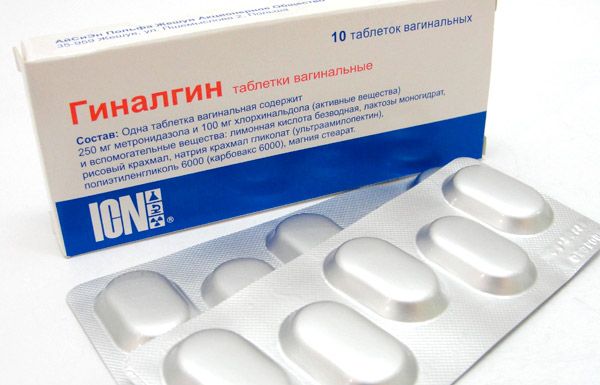
During prophylactic use of Ginalgin, the sexual partner must take Metronidazole. Long-term use of the drug can cause itching and allergic reactions. The drug is contraindicated during pregnancy.
- Diflucan - tablets for the prevention of thrush of any localization and form. The drug is prescribed for acquired immunodeficiency syndrome and candidiasis. The course of prevention takes from 3 to 5 days. On the first day, take 100 mg of Diflucan, and on the following days, 200 mg. Side effects cause headache, diarrhea, flatulence, nausea. The drug is contraindicated for use during pregnancy and lactation.
- Klion-D – antifungal vaginal tablets used for the treatment and prevention of candidiasis, vaginitis and other fungal infections. The standard course of treatment is 10 days, the prophylactic course is 3-5 days.
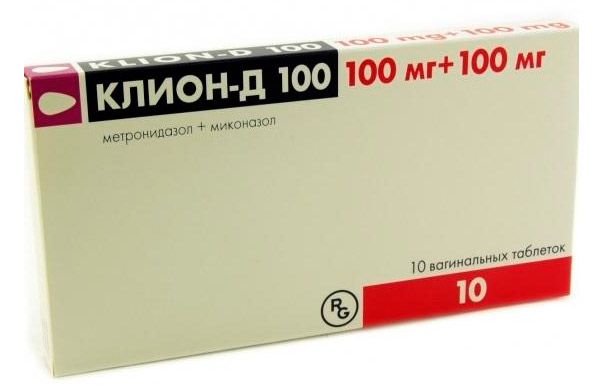
In case of overdose, Klion-D causes nausea, allergic reactions, bitterness in the mouth, leukopenia. Taking the medicine during pregnancy is contraindicated.
- Macmiror - tablets for prevention. Used to treat genitourinary infections and discharge caused by bacteria and fungi.
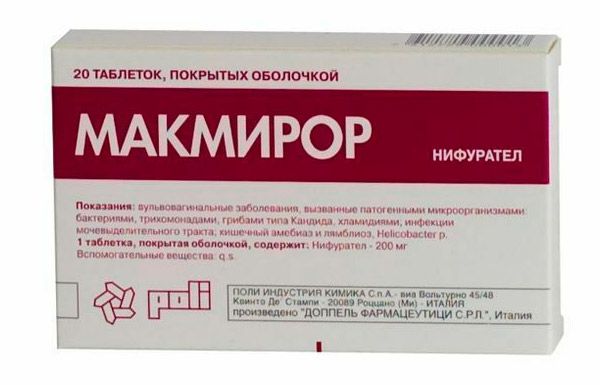
The prophylactic course of treatment is three days. Macmiror is prohibited during pregnancy and lactation.
- Orungal is available in capsules and effectively fights fungal diseases. For prevention, take one tablet of 200 mg for three days. The drug causes side effects such as: rash, constipation, headache and dizziness. Treatment of side effects and overdose is symptomatic. During pregnancy, the drug is prescribed only in extreme cases, with acute manifestations of thrush.
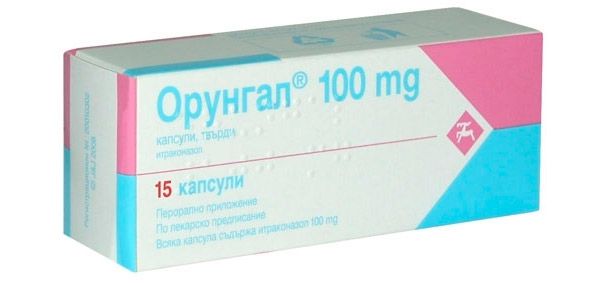
In addition to taking pills for thrush, prevention of fungal disease involves following a diet and hygiene rules. Let's look at the basic recommendations that will help prevent relapses of the disease and other vaginal fungal infections.
- Limit or completely eliminate sugar consumption. The diet should include dairy products with live acidophilic lactic acid bacteria. Eat fruits that are rich in vitamin A more often. Since this vitamin is an excellent preventative for thrush, which does not cause side effects and has no contraindications.
- Pay special attention to intimate hygiene. Washing should be done only from front to back. During menstruation, it is better to use pads and change them as often as possible. It would be a good idea to give up hygienic gels, sprays and deodorants, which irritate the vaginal mucosa.
- Wear underwear made only from natural materials, avoid thongs and synthetic panties. Tight jeans are also prohibited. It is also forbidden to stay in a wet swimsuit for a long time, as this negatively affects the vaginal microflora and can provoke the appearance of the disease. It is necessary to sleep without underwear, instead of pajamas, give preference to nightgowns made of natural fabrics.
Method of administration and dosage
The method of application and dosage of tablets for thrush depend on the selected drug, the treatment regimen prepared by the doctor, the patient's age and other individual characteristics. Today, among the antifungal drugs that treat the disease, there are tablets that help get rid of the disease in one go. Such rapid treatment is also used for preventive purposes. This is relevant for patients with a recurrent form.
In order for the tablets for thrush to really help get rid of the disease, you need to see a doctor. Only a doctor can select the correct dosage that will destroy fungal infections. But for this, the patient needs to take tests (blood, smears) and undergo an examination. As a rule, the duration of use of tablets for thrush does not take more than 10 days, and the dosage can be from 50 mg to 400 mg of the drug, from one to three times a day.
Tablets for thrush for pregnant women
Tablets for thrush for pregnant women allow you to cure an unpleasant fungal disease that is a threat to pregnancy and the normal development of the child. The disease manifests itself in the form of vaginal lesions. Candidiasis occurs in 40% of pregnant women. When choosing tablets, special attention should be paid to the fact that the drug is non-toxic, as this negatively affects the development of the child. Tablets should be effective and have a minimum of side effects and contraindications.
Indications for the use of tablets for thrush during pregnancy should be based on the results of the tests, the pregnancy period and symptoms. The most commonly used tablets are Nystatin, Natamycin, Sertaconazole. In particularly severe cases of the disease, pregnant women are prescribed Pimafucin. But it is necessary to refuse to take Ketoconazole, Fluconazole and Miconazole, since the drugs have a number of negative side effects on the development of the baby. In addition to antifungal drugs, the pregnant woman should follow a diet, hygiene rules and a number of other recommendations that will help cure the disease.
Contraindications to the use of tablets for thrush
Contraindications to the use of tablets for thrush are based on individual sensitivity to the active substance of the drug. Many tablets are prohibited to take during menstruation, as this negatively affects the cycle and the hormonal system as a whole. Another contraindication for antifungal drugs is the period of pregnancy and lactation. The ban is based on the fact that many drugs are toxic and can negatively affect the development of the child and the health of the woman, and in some cases provoke a miscarriage or premature birth.
It is forbidden to take pills for thrush with drugs that reduce blood clotting. Contraindications also concern the age of the patient. Some pills are prohibited for children and the elderly. And kidney and liver diseases are a ban on taking any antifungal drugs. If you do not follow the instructions and take medications for treatment in the presence of contraindications, this will lead to the appearance of side uncontrolled symptoms. It is also contraindicated to self-medicate and take pills on your own without consulting a doctor. Since this can lead to the disease becoming chronic, and it will be problematic to cure it.
 [ 4 ]
[ 4 ]
Side effects of thrush pills
Side effects of tablets for thrush occur if the conditions for using the drug were not met, the dosage, duration of administration were violated, or there are contraindications to using the drug. Most often, overdose symptoms manifest themselves in the form of nausea, diarrhea, vomiting, headaches. In particularly severe cases, side effects cause hallucinations, disorders of the nervous and cardiovascular systems, allergic reactions on the skin.
If side effects occur, you should stop taking the pills for thrush and seek medical help. As a rule, treatment of side effects is symptomatic.
Overdose
An overdose of tablets for thrush is possible if the conditions for taking antifungal drugs have not been met. Increased dosage and long-term treatment also cause an overdose. The main symptoms of an overdose are nausea, vomiting, diarrhea, headaches and hallucinations. In rare cases, patients experience complications in the functioning of the kidneys and liver, and the level of bilirubin and cholesterol in the blood increases. Since almost all tablets for thrush have the same mechanism of action, the side effects and symptoms of an overdose are similar.
To treat an overdose, the patient's stomach is washed, and drugs are administered intravenously to help remove the antifungal agent from the body. In case of minor overdose symptoms, patients are prescribed diuretics to help remove the breakdown products of the drugs from the body. In particularly severe cases, patients undergo hemodialysis, i.e. blood purification, and are hospitalized for further therapy.
Interactions with other drugs
Interaction of tablets from thrush with other drugs is possible only with the permission of a doctor. Antifungal agents when taken simultaneously with Warfarin increase prothrombin time, that is, the level of blood clotting.
When used with oral hypoglycemic drugs, the half-life of the drugs increases.
- When using the drug with Hydrochlorothiazide, the concentration of antifungal agents in the blood plasma increases, so a dose adjustment is necessary.
- Almost all antifungal agents interact normally with combined oral contraceptives.
- Take with special caution with Theophylline and Cisapride. Since such interaction can lead to adverse reactions from the cardiovascular system or increased toxicity of the antifungal agent.
When using tablets for thrush with any medications, you must consult a doctor and carefully read the instructions for the drug. This will help to avoid side effects and overdose symptoms.
Storage conditions
Storage conditions for thrush tablets correspond to the rules for storing any other tablet preparations. Tablets must be stored in a dry, cool place, protected from sunlight and inaccessible to children. Also, antifungal drugs must be stored in the original packaging. When storing vaginal tablets, special attention should be paid to the temperature regime. Medicines are stored at a temperature of up to 25 ° C.
Failure to comply with the storage conditions of tablets for thrush leads to the loss of their medicinal properties. In addition, due to improper storage, the drug may change its appearance, consistency and acquire an unpleasant odor. In this case, taking the medicine is prohibited. Since the use of a spoiled drug will lead to the appearance of uncontrolled side effects that will only worsen the course of the disease.
Best before date
The expiration date of the tablets for thrush is indicated on the packaging of the antifungal agent. As a rule, the expiration date is from two to five years. The suitability of the drug depends entirely on compliance with the storage conditions. If the tablets have changed color or acquired an unpleasant odor, but the expiration date has not yet passed, such drugs are prohibited from being taken. Since this indicates that the storage conditions of the drug were violated. After the expiration date, the drug must be disposed of.
Price of tablets for thrush
The price of tablets for thrush depends on the effectiveness of the drug, the form of release (vaginal, oral) and the volume of the active substance in the antifungal drug. Also, do not forget about the number of tablets in the package. Some drugs are sold three tablets per package for the preventive treatment of the disease, others one. But the same remedy can be purchased in a package with a large number of tablets and at a completely different price.
The price of pills for thrush depends on the toxicity of the drug and its spectrum of action. If the drug is approved for use during pregnancy and lactation, then the price of such an antifungal agent is high. There are both cheap but effective drugs and expensive drugs that help cure infectious and fungal lesions of different localizations. Let's consider the most popular pills for thrush and their cost.
Preparation |
Price of tablets for thrush |
Orungal |
From 225 UAH. |
Fucis |
From 10 to 45 UAH. |
Klion-D |
From 50 to 100 UAH. |
Zalain |
From 70 to 150 UAH. |
Canesten |
From 20 to 60 UAH. |
Ovulum |
From 80 to 120 UAH. |
Itraconazole |
From 80 to 200 UAH. |
Sertaconazole |
From 50 to 150 UAH. |
Miramistin |
From 20 to 50 UAH. |
Terzhinan |
From 50 to 200 UAH. |
Macmirror |
From 80 to 210 UAH. |
Diflucan |
From 90 to 700 UAH. |
Ginalgin |
From 30 to 60 UAH. |
Mycomax |
From 30 to 100 UAH. |
Irunin |
From 260 to 400 UAH. |
Livarol |
From 60 to 130 UAH. |
Nizoral |
From 80 to 200 UAH. |
Mikosist |
From 100 to 800 UAH. |
Difluzol |
From 20 to 60 UAH. |
Nystatin |
From 8 to 15 UAH. |
Pimafucin |
From 60 to 220 UAH. |
Clotrimazole |
From 5 to 10 UAH. |
Flucostat |
From 120 to 210 UAH. |
Fluconazole |
From 5 to 80 UAH. |
Tinidazole |
From 10 to 50 UAH. |
Macmirror |
From 80 to 200 UAH. |
Ginalgin |
From 30 to 60 UAH. |
Thrush tablets are modern antifungal drugs that help cure candidiasis of any localization, form and in patients of any age. Tablets are recommended to be taken only with a doctor's permission, after passing a series of tests and a medical examination. The duration of treatment using tablets can be from one to ten days. Taking medications on your own is contraindicated.
Attention!
To simplify the perception of information, this instruction for use of the drug "Pills for thrush" translated and presented in a special form on the basis of the official instructions for medical use of the drug. Before use read the annotation that came directly to medicines.
Description provided for informational purposes and is not a guide to self-healing. The need for this drug, the purpose of the treatment regimen, methods and dose of the drug is determined solely by the attending physician. Self-medication is dangerous for your health.

